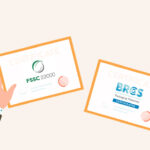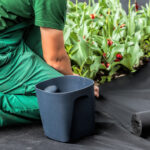Introduction
Bisphenol A, commonly known as BPA, is a chemical used for many years to make plastics and resins. It is found in various everyday items, such as water bottles, food containers, and even the linings of canned foods. People like using BPA because it makes plastics durable and long-lasting.
However, there are some worries about BPA’s safety. Studies have shown that BPA can seep into food and drinks from containers made with the chemical. This is concerning because BPA exposure might affect the body’s hormones like tiny messengers telling our body how to grow and behave. Some scientists believe that BPA could be linked to heart and digestion problems and changes in children’s growth and behavior.
Because of these concerns, many people and companies are turning to BPA-free alternatives. One of the safest and most popular options is polypropylene. This material is free from BPA, making it an excellent choice for products that touch food and drinks. Polypropylene is safe but also solid and reusable, which is good for our health and the planet.
Understanding BPA and Its Risks
The BPA materials are commonly found in various consumer products, including water bottles, sports equipment, and compact discs. BPA is particularly valued in the industry for making plastics clear and durable. It is also used in epoxy resins, which act as a protective lining on the inside of metal-based food and beverage cans to prevent corrosion and contamination.
Health Concerns and Regulatory Responses to BPA Usage
The use of BPA has raised health concerns because it can leach into food and drinks from the containers that are made with it, significantly when they are heated or damaged. Research has linked BPA exposure to various health issues, including hormonal disruptions and potential risks to the brain and reproductive systems. These concerns have led to significant regulatory responses worldwide. For instance, the United States, Canada, and the European Union have banned BPA in baby bottles and children’s drinking items. As public awareness has increased, a growing demand for BPA-free products has prompted manufacturers to seek safer alternatives to BPA in their products.
Polypropylene – A Safer Alternative
Polypropylene is a plastic that doesn’t use BPA, making it a safer choice for products we use every day. It’s perfect for items touching our food and drinks, like water bottles and containers.
Why Polypropylene Is Safe for Food and Beverages
Polypropylene is excellent for food-related products because it doesn’t contain BPA. This means it won’t leak harmful chemicals into your food or drinks. It’s also resistant to heat, so you can use it in the microwave or dishwasher without worrying about harmful substances entering your meal.
Benefits of Using Polypropylene
Besides being safe, polypropylene is tough and can last long, which is great for everyday use. It doesn’t break easily, so you don’t have to replace your items often. This type of plastic is also very light, which makes it easy to carry around, like in a lunchbox or picnic basket.
Comparing Polypropylene to Other Plastics
Polypropylene is safe and durable, and it’s more recyclable than many other plastics, which is good for the planet. Many recycling programs accept polypropylene, which helps reduce waste. Because of these benefits, polypropylene is a top choice for making many food storage products.
Anita Plastics: BPA-Free Polypropylene Product Manufacturer
Anita Plastics is dedicated to providing safe, high-quality products for their customers. All their storage and container products, including PP Woven Bags, BOPP Bags, Paper Poly Bags, and Bulk Bags, are made from BPA-free polypropylene and HDPE materials. This ensures that their products are safe for storing food, beverages, and other items that come into contact with our daily lives, protecting consumers from potential health risks associated with BPA.
PP Woven Bags
Known for their strength and durability, PP Woven Bags are perfect for carrying heavy items without tearing and are reusable, making them an eco-friendly option. Being BPA-free means they are safe for food storage and handling, ensuring no harmful chemicals leach into the contents.
BOPP Bags
BOPP (Biaxially Oriented Polypropylene) Bags offer excellent clarity and strength. These bags are commonly used for packaging food products, ensuring that the contents remain safe and fresh. The BPA-free nature of these bags guarantees that no harmful chemicals will contaminate the food, making them a safe choice for food packaging.
Paper Poly Bags
Paper Poly Bags combine the strength of polypropylene with the eco-friendliness of paper. They are ideal for packaging products that require a higher level of protection while maintaining an environmentally conscious approach. Being BPA-free, these bags provide a safe packaging solution without the risk of chemical contamination.
Bulk Bags
Designed for heavy-duty storage and transportation, Bulk Bags are made from durable, BPA-free materials. This makes them perfect for industrial and commercial use, ensuring that stored items are free from harmful BPA contamination, which is particularly important for food and beverage industries.
Block Bottom Bags
Block-bottom bags offer a stable base for easy stacking and efficient use of space. They are made from BPA-free materials, making them safe for storing food and other sensitive items. Their strong construction ensures durability, and their BPA-free nature provides peace of mind that no harmful chemicals will leach into the contents.
Choosing BPA-free products is crucial for protecting our health and the environment. By opting for Anita Plastics’ BPA-free storage and container products, consumers can ensure their food and beverages remain safe from harmful chemicals while supporting sustainable practices.
How to Tell If A Plastic Product Is BPA-Free
Is a plastic product safe from BPA? Here’s how you can tell:
- Look for Labels: The easiest way to know is to check the label. Most products that are BPA-free proudly say so. Look for words like “BPA-free” on the packaging.
- Check the Recycling Code: Turn the product over and look for the recycling triangle, usually found at the bottom. If it has a number “5” inside the triangle, it means the product is made of polypropylene, which is BPA-free. Stay cautious of plastics with recycling codes “3” and “7,” as these may contain BPA unless labeled otherwise.
- Read Product Descriptions: When you shop online, the product descriptions usually mention whether the item is BPA-free. This is a key selling point for health-conscious consumers, so manufacturers often highlight this.
- Contact the Manufacturer: If you still need clarification, feel free to contact the manufacturer directly. They can provide you with the necessary information about the materials used in their products.
Using these simple steps, you can make safer choices when buying plastic products for you and your family.
Choosing BPA-free products is crucial not only for our health but also for the environment. By opting for products without BPA, we reduce our exposure to harmful chemicals and support sustainable practices. It’s essential to stay informed about the materials used in the products we buy daily, especially those in direct contact with our food and drinks. Let’s make conscious choices and support companies and brands that commit to our health by offering BPA-free alternatives. Every purchase is a vote for safer products and a healthier planet. Start checking labels today, and choose to be part of a healthier future for everyone.




